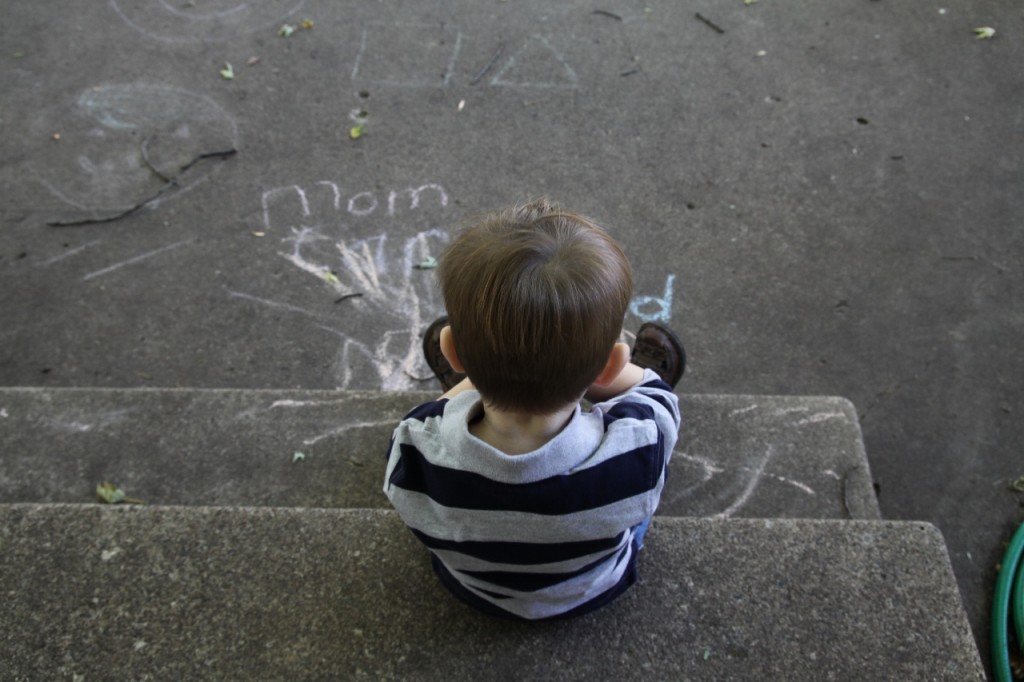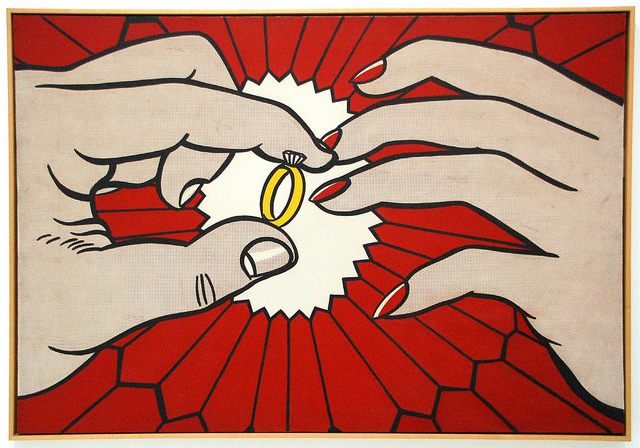Photo by William Brawley/Flickr
By Andrew Forrester
I’m staring at this fleshy alien, wrapped straightjacket-tight in a swaddling blanket. He’s sort of quietly writhing in a clear plastic box, and I’ve thought about a dozen times that, even for a hospital, this all seems overly clinical. A plastic box? It looks like something from the Container Store, something much more suited to storing winter clothes or high school yearbooks, or maybe small reptiles. But instead, it’s holding my newborn son, and I’m having one of those dad moments that can come off as trite but which are really quite profound: my newborn son, sleeping. My son.
For some reason, when I think of a typical dad on the day of his first child’s birth, I think of Jimmy Stewart in It’s a Wonderful Life. I don’t actually know the movie that well, but Jimmy Stewart’s husband-cum-dad persona—businesslike and anxious all at once—seems about right for a day like today. But whereas Jimmy would be rushing in and out of the hospital room for work and occasionally haranguing nurses about his concerns while never quite connecting with his actual child, I am trapped in something that feels more like a thriller than whatever genre It’s a Wonderful Life falls into. I’m frozen, heart pounding, anxious without anything resembling businesslikeness. That’s my baby. James. If I take my eyes off him for a second, what will go wrong? Suddenly, we’re in the movie Speed, but the bus is my child, and I’m Keanu, and the point is that something disastrous could happen if I fail to—what?
I don’t know. But I am a dad now, and my child is sitting in a plastic tub, and his head has turned to the side, and if I know anything about babies, it’s that they can’t control their heads, and I wonder if I should get someone, because what if he can’t breathe in that position? He’s so tiny and vulnerable, and no one in this hospital, not even my wife Megan, seems to care. But I’m also so tired, and I’m not even the one who did the actual having of the baby, so my tiredness seems selfish. But I’m still so tired. And it seems like the best thing would be to pick him up, so that I can control his head for him, but I also want to lie down. I want to lie down so badly, but this couch I’m sitting on is an affront to dads, moms, birth partners everywhere. It’s manufactured to fit maybe a ten-year-old comfortably, and honestly, I should probably have a word with someone in charge, because this is unacceptable—how do they expect fathers of newborn children who have no head control to be able to sleep on this nightmare bench? How do they expect us to sleep at all?
The hospital has a policy of encouraging “sleeping in,” which just means that they want mothers and babies to spend their nights together, I guess because that way they’ll get used to each other. I am a rule follower, so of course I’m determined to align my thinking with the hospital’s. They are the experts. I’m a twenty-eight-year-old grad student, and it’s not like I’m even studying something useful. My qualifying exams on Victorian literature have not prepared me for this moment, except that I can now amuse myself by talking about how Megan’s period of “lying in” is over. No, I don’t know anything about biology or child development, so if this very domineering nurse says James should sleep in the room with us, then the very domineering nurse must be right.
I decide to take a chance and pull my eyes away from James for a moment, because that’s what you have to do. Like watchers on some ancient city wall guarding something precious, fathers throughout history have had to take breaks to eat, to sleep, to use the chamber pot or whatever. I turn to Megan. The clichéd thing to say is that she looks beautiful, lying there in her hospital bed, a soft, angelic glow somehow coalescing through the commingling of the fluorescent hospital lights. (I know nothing of physics, either).
But, while Megan is very beautiful, the truth is that she looks tired. Tired with an edge. Tired like an old person, which is to say, tired with a kind of wisdom, and a kind of impatience. Leading up to the birth, Megan has been understandably emotional and a little fearful about the realities of labor, while I have tried my best to be everything Steve Martin isn’t in the Father of the Bride movies. I am loving. I am supportive. I am calm. I am rational. I am not going to rip hot dog buns out of their packaging in the grocery store or sell my family home to a ruthless developer, only to buy it back at a higher price. But something strange has happened now, and our roles have switched, and I have upped the ante. I am far more emotional than Megan ever was. I’m a quivering mess, and even in these few seconds, even as my head has rotated on my spine to look at Megan, I’ve thought, “I wonder if he’s dying back there.”
Megan can tell. Not that I think James might somehow be dead. But that I am terrified.
“You should go,” she says. Not lovingly. Not angrily. Just a curt statement of fact, stating the obvious. “Murder is bad.” “Two plus two is four.” “You are about to explode into a thousand anxious pieces, so you really should leave this hospital.”
“What?” I say, and suddenly I do sound like Jimmy Stewart, with that steel guitar shock in his voice. What? Mary! You want the moon?
“You should go. You need a break.”
“I need a break?”
If I need a break, then I am an absolute disgrace. This woman has just given birth. Strike that. She hasn’t “just” done anything. This has taken nine months. There has been vomit. There has been vertigo. Uncomfortable below-the-waist exams. A preeclampsia scare. And she still went to work every morning at six-thirty. Then she did this.
I look back at the baby. He’s alive, but now he has hiccups, and they seem far too powerful for someone who is only seven hours old. I make a mental note to check with a nurse when Megan and I are finished talking.
I’m trapped again. I can’t take my eyes off him.
“Yes,” she continues from behind me, “you need a break. You’re tired. You should go home and take a shower.”
“I—what?”
I can’t even argue.
It sounds so good. I want to do it. I need to do it. I—
I’m crying. Not hard crying. Sad movie moment crying. The kind of crying you can hide from your boss or people on the street, but not from your wife.
I chance a look back at Megan, who assesses me. I am a suspect, and she is the detective behind the two-way mirror.
“Yeah, honestly, you should probably just go and sleep there. Go home and come back refreshed. I’ll send him to the nursery. People do it all the time.”
Who is this woman?
I cannot send my newborn child to the nursery like some sort of cigar-smoking father from the 1940s. I cannot Jimmy Stewart my baby.
But it sounds so good, too. It sounds so, so good. We have been at the hospital for over twenty-four hours. I spent the night on a different nightmare bench in a different room, while they induced Megan, thanks to the preeclampsia scare.
“Okay,” I say, no longer crying, watching James once more. “I’ll go home and shower. Then I’ll let you know. I’ll probably come back, but I’ll let you know.”
“You should just sleep there,” she says again. Her eyes are narrow, and she has not so much as nodded reassuringly.
“I’ll let you know.”
I drive home in a daze. The hospital is not close, but somehow, I’m already in my driveway. Linda, my mother-in-law, is inside, watching TV on the couch. I give her a quick update and head straight for the shower.
You know how, in movies, when characters are sad, and it’s raining, you feel like, okay, maybe you guys are laying it on a little thick here? And you think back to your high school English class, and remember how your teacher talked kind of patronizingly about “pathetic fallacy,” and convinced you that reflecting a character’s mood in the weather is a little bit lazy, don’t you think? Well, crying in the shower isn’t an example of pathetic fallacy, but it’s in the same vein. It’s bad writing.
It’s still what happens to me.
I turn on the water, strip down, step in, and weep. I mean, weep.
And I talk. It’s kind of like praying, kind of like pleading.
What have we done?
We shouldn’t have done this.
Why did we do this?
I’m not cut out for this.
In the back of my mind, I know that these thoughts, like the glowing postnatal woman and my current state of crying in the shower, are clichés. Every dad thinks these things. But there’s also a part of me that thinks, no, really, I am specifically not cut out for this. Other people can do this. I cannot. I cannot shepherd this tiny perfect human into adulthood. I cannot shoulder that responsibility. I am sure to break him, physically and emotionally and all the other –allys. Megan is so strong and I am so weak, so out-of-control, so ready to lie down and sleep in an actual bed with sheets and a mattress that extends beyond the length of your average park bench.
I want to do it. I want to stay home, and sleep, and go back refreshed, like Megan said.
I dry off and get dressed and decide to run the idea past Linda.
People talk about bad mothers-in-law like it’s a given thing. Like you’re as likely to have an overbearing, judgmental mother-in-law as you are to have an overbearing, judgmental barista at one of those artisanal coffee shops where they expect you to have an espresso preference. But I have a very good mother-in-law. She’s kind and supportive and would rather die—seriously, die—than put her opinions where they don’t belong. She is a good person to run this question by.
“Megan says I should sleep here, but do you think that’s okay, because I feel like I’m failing her in some way if I do that, and if I’m failing her then I’m also failing as a dad, and I just feel really bad for leaving her and bad that she’s sending him to the nursery and I—”
Obviously, I am crying again. Weeping, again, actually, and to my mother-in-law.
There is often shame in weeping. We look at the exaggerated mourning rituals of other cultures, and we judge them. Or at the very least, we wish they would show some dignity. Weeping in the shower is embarrassing, but in a contained way, an I-can’t-believe-I-did-that way. Weeping to a mother-in-law, even a very good mother-in-law, is horrific. I wish I could show some dignity.
Linda jumps to her feet, which are wrapped up in fuzzy white slippers, and pulls me into a hug, and I don’t exactly realize it, but this is what I need. A second strange shifting of roles, for me at least. From father to child. She holds me, only for a few seconds, and she lets me cry, and she doesn’t try to tell me what to do or think, though she does answer my question.
“I think it’s totally fine if you stay here,” she says. “You don’t need to feel guilty.” And it’s like she’s given me permission. No one has given me permission for a long time. I’m a dad now. I’m a permission-giver, but for the last hour, I’ve been silently begging for someone to take authority from me, to take decision-making power from me, to relinquish me of my choices and my worries and the weight of fatherhood, and here, Linda is doing it, and Megan has already done it, and I just have to accept it.
I do.
I stop crying, and we laugh a little, and then I go to our bedroom—the room that Megan and James and I will share for the next six or so months—and I get in bed. I take a break. I read a bit. I check my phone and text Megan. I’m comfortable, and there is no baby to watch, and if, for a second, I am fearful of the night after next, when James is here in this room with us and I can’t take my eyes off him, and no nurses roam the halls outside, waiting to be accosted with questions about the hiccups that shake their patients’ miniature bodies, then it’s only for a second, and soon, I’m sleeping. Hard.
The next day, I arrive at the hospital room before James does. I sit on the nightmare bench, and I tell Megan about the night before. About weeping in the shower and crying to her mom, about realizing that I was overwhelmed and guilty and terrified of failure, and that, even if I’m still all of those things, the break was nice. I’m grateful for it.
Megan is warm again. “Of course,” she smiles. “We were totally fine.”
And then the nurses wheel in James, in his little plastic box. And he is totally fine. He’s tiny and helpless. All he really wants is milk, and even that is a struggle. The nurse has to help him latch, which, if I let it, will worry me, too, because what if he’s not getting the nutrition he needs, and what do we do when we get home and the domineering nurse is gone, and and and.
The nurse lifts him from his Tupperware container and brings him to me, so that I can hold him for a moment before I give him to Megan to nurse. The very moment he came into the world, our doctor said, “I think he looks like you,” and she was right. Even I could see it. I see it now. He’s my son, and I don’t know what all that means, but I know that I love him, and I’m afraid of him. I know that I will hurt him, and he will hurt me. I know that I’m proud of him.
He is wonderful, and I am wonderstruck. And I can’t take my eyes off him.
•••
ANDREW FORRESTER is a writer and teacher who recently received his PhD in English literature. His work has appeared in academic journals, Full Grown People, and McSweeney’s Internet Tendency. He lives in Austin, Texas, with his wife and son.


 Follow
Follow


